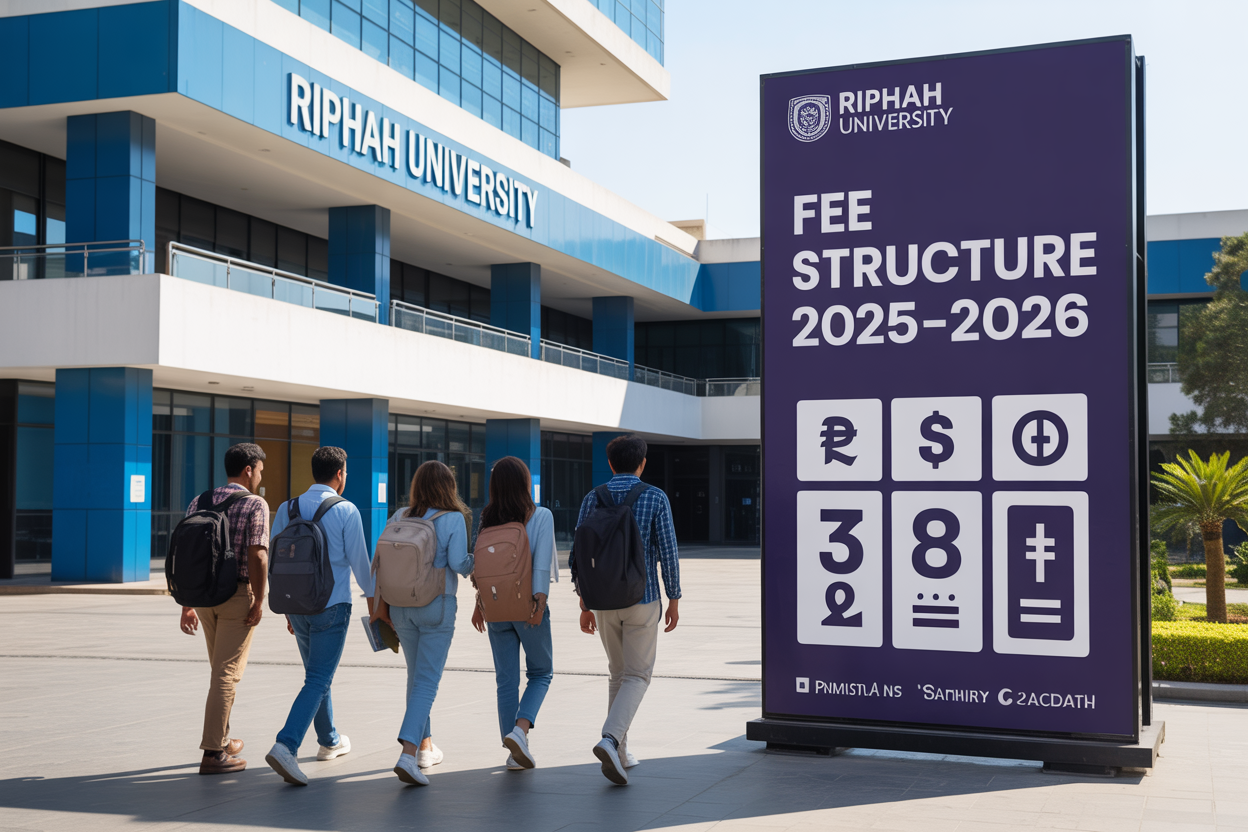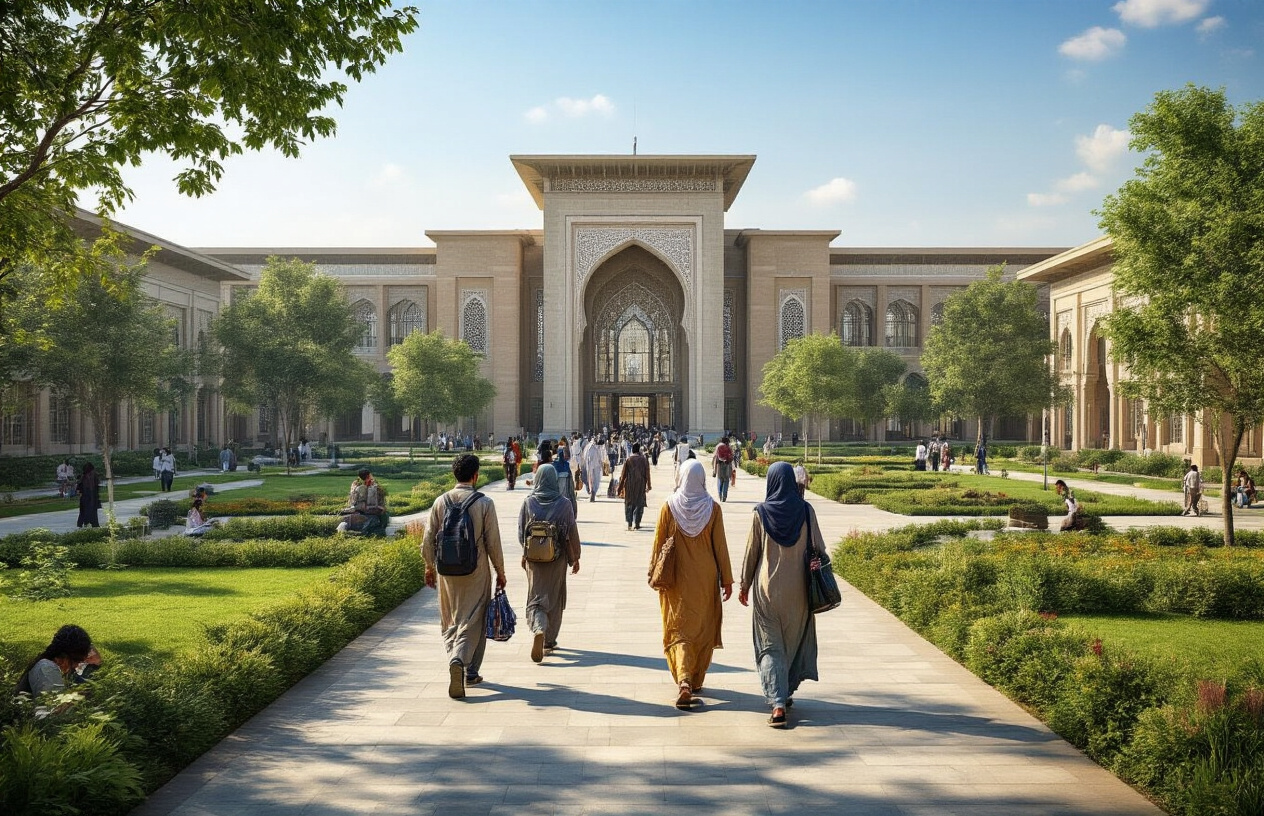
Planning to study at Riphah University and need clear details about costs? The Fee Structure Of Riphah University 2025-2026 can seem complex with various components and program-specific charges.
This guide is designed for prospective students and their families who want straightforward information about tuition costs, payment options, and budget planning for their education at Riphah University.
We’ll break down the complete fee breakdown for undergraduate and graduate programs, explain additional charges you should expect beyond basic tuition, and explore available payment plans and financial aid options to help make your education more affordable.
Overview of Riphah University Fee Components

Tuition fees breakdown by program type
Riphah University structures its tuition fees based on program categories and academic levels. Engineering programs typically charge between PKR 180,000 to 220,000 per semester, reflecting the specialized equipment and faculty expertise required. Medical programs command the highest fees, ranging from PKR 350,000 to 450,000 per semester due to clinical training requirements and advanced laboratory facilities.
Business and management programs fall in the mid-range bracket, with semester fees around PKR 120,000 to 160,000. Arts and humanities programs offer more affordable options, generally costing PKR 80,000 to 120,000 per semester. Computer science and IT programs charge approximately PKR 140,000 to 180,000 per semester, considering the technology infrastructure needs.
| Program Type | Semester Fee Range (PKR) |
|---|---|
| Medical Sciences | 350,000 – 450,000 |
| Engineering | 180,000 – 220,000 |
| Computer Science/IT | 140,000 – 180,000 |
| Business/Management | 120,000 – 160,000 |
| Arts/Humanities | 80,000 – 120,000 |
Laboratory and practical fees structure
Laboratory fees vary significantly across different faculties and depend on the equipment intensity of each program. Medical students face the steepest lab charges, approximately PKR 25,000 to 40,000 per semester, covering anatomy labs, pathology equipment, and clinical simulation tools.
Engineering students pay around PKR 15,000 to 30,000 per semester for workshop access, machinery usage, and project materials. Computer science programs charge PKR 10,000 to 20,000 for software licensing, server access, and hardware maintenance.
Science programs including chemistry, physics, and biology require lab fees ranging from PKR 8,000 to 18,000 per semester. These charges cover consumables, equipment maintenance, and safety measures. Students often pay additional fees for specialized experiments or research projects beyond the standard curriculum.
Library and technology charges
Digital infrastructure fees amount to PKR 5,000 to 8,000 per semester, covering campus-wide WiFi, learning management systems, and online database subscriptions. Library access fees range from PKR 3,000 to 6,000 per semester, including physical book access, digital resources, and study space utilization.
Technology charges also include:
- Student portal maintenance: PKR 1,500 per semester
- Email and cloud storage: PKR 1,000 per semester
- Printing and photocopying credits: PKR 2,000 per semester
- Software licensing for specialized programs: PKR 3,000-8,000 per semester
Registration and administrative costs
Administrative fees create a baseline cost for all students regardless of their chosen program. Registration fees typically cost PKR 15,000 to 25,000 at the start of each academic year. Student ID card issuance and replacement costs PKR 500 to 1,000.
Examination fees range from PKR 3,000 to 8,000 per semester depending on the number of courses and assessment complexity. Transcript processing charges PKR 2,000 for official copies, while degree verification services cost PKR 1,500.
Additional administrative charges include:
- Late registration penalty: PKR 5,000-10,000
- Course change fees: PKR 2,000 per modification
- Makeup examination fees: PKR 1,500 per exam
- Document verification: PKR 1,000-3,000
- Migration certificate: PKR 5,000
Undergraduate Program Fee Details

Business and Management Studies Costs
Business programs at Riphah University offer excellent value with competitive fee structures designed for Pakistani students. The BBA program typically ranges from PKR 85,000 to 120,000 per semester, depending on your chosen specialization. Marketing, finance, and human resource management tracks fall within the standard fee bracket, while specialized programs like international business or entrepreneurship may carry additional charges of PKR 10,000 to 15,000 per semester.
MBA programs command higher fees, ranging from PKR 150,000 to 200,000 per semester. Executive MBA options, designed for working professionals with weekend classes, cost approximately PKR 180,000 to 220,000 per semester. These programs include case study materials, industry visits, and access to digital libraries.
Commerce students pursuing B.Com degrees pay around PKR 65,000 to 85,000 per semester, making it one of the most affordable options. M.Com programs cost between PKR 95,000 to 125,000 per semester, including thesis supervision fees.
Engineering and Technology Program Fees
Engineering remains one of Riphah’s premium offerings with fees reflecting the high-quality education and state-of-the-art facilities. Computer Science and Software Engineering programs cost approximately PKR 140,000 to 175,000 per semester. These fees cover laboratory access, software licensing, and project development tools.
Electrical Engineering students pay similar amounts, ranging from PKR 135,000 to 170,000 per semester. The program includes specialized lab equipment usage, circuit simulation software, and hands-on project materials.
Civil Engineering programs are priced between PKR 130,000 to 165,000 per semester, covering field trip expenses, surveying equipment, and CAD software access. Mechanical Engineering follows a comparable structure at PKR 135,000 to 170,000 per semester.
MS Engineering programs typically cost PKR 180,000 to 220,000 per semester, including research supervision, thesis binding, and conference presentation opportunities. PhD programs vary significantly based on research requirements but generally range from PKR 95,000 to 130,000 per semester.
Medical and Health Sciences Charges
Medical programs represent the highest fee category due to extensive clinical training and equipment requirements. MBBS programs cost approximately PKR 350,000 to 450,000 per semester, covering clinical rotations, laboratory sessions, and medical equipment usage. These fees include hospital training expenses and medical simulation lab access.
BDS (Bachelor of Dental Surgery) programs range from PKR 280,000 to 380,000 per semester, including dental clinic practice, specialized equipment, and materials for practical training. Pharmacy programs (Pharm-D) cost between PKR 180,000 to 250,000 per semester, covering pharmaceutical laboratory work and clinical pharmacy training.
Nursing programs offer more affordable options, with BSN degrees costing PKR 95,000 to 135,000 per semester. These fees include clinical placement costs, uniform expenses, and practical training materials.
Postgraduate medical programs like MS in various medical specializations range from PKR 400,000 to 550,000 per semester, depending on the specialty chosen. Surgical specialties typically cost more than non-surgical ones.
Arts and Social Sciences Fee Structure
Liberal arts programs provide budget-friendly education options for students interested in humanities and social sciences. BA programs typically cost PKR 55,000 to 75,000 per semester across various subjects including psychology, sociology, English literature, and political science.
MA programs in arts subjects range from PKR 75,000 to 105,000 per semester, including thesis supervision and research methodology training. Psychology programs, both undergraduate and graduate, may cost slightly more due to practical components and laboratory requirements.
Education programs preparing future teachers cost approximately PKR 60,000 to 85,000 per semester for undergraduate degrees, while M.Ed programs range from PKR 85,000 to 115,000 per semester. These fees often include teaching practice supervision and educational resource access.
Mass Communication and Journalism programs cost between PKR 80,000 to 110,000 per semester, covering media lab usage, equipment access, and field reporting expenses. Production costs for student media projects are typically included in the semester fees.
Islamic Studies and Languages Costs
Islamic Studies programs maintain affordable fee structures to encourage religious education. BS Islamic Studies costs approximately PKR 50,000 to 70,000 per semester, making it one of the most economical degree options available. The program includes access to extensive Islamic literature collections and scholarly resources.
Arabic Language programs range from PKR 45,000 to 65,000 per semester for undergraduate studies, while advanced degrees cost PKR 70,000 to 95,000 per semester. These programs often include cultural immersion activities and language laboratory access.
Quranic Studies and Tafseer programs typically cost PKR 48,000 to 68,000 per semester, covering specialized texts, commentary materials, and scholarly supervision. Hadith Studies programs follow similar pricing structures.
Modern language programs including English, Urdu, and other international languages cost between PKR 55,000 to 80,000 per semester. These programs include language laboratory usage, multimedia resources, and conversation practice sessions. Translation and interpretation specializations may carry additional fees of PKR 5,000 to 10,000 per semester for specialized software and training materials.
Graduate and Postgraduate Program Costs

Master’s Degree Program Fees by Faculty
The master’s degree programs at Riphah University span multiple faculties, each with distinct fee structures reflecting their specialized requirements and resources. The Faculty of Medicine charges approximately PKR 450,000 to PKR 650,000 per year for programs like Master of Public Health (MPH) and Clinical specializations. These programs command higher fees due to extensive clinical training, specialized equipment access, and expert faculty requirements.
Business and Management programs through the Faculty of Management Sciences range from PKR 280,000 to PKR 420,000 annually. Popular programs include MBA, MS in Project Management, and MS in Marketing, with executive MBA programs typically positioned at the higher end of this range due to weekend scheduling and industry-focused curriculum.
The Faculty of Engineering and Computer Science offers master’s degrees ranging from PKR 320,000 to PKR 480,000 per year. Programs like MS Computer Science, MS Software Engineering, and MS Electrical Engineering incorporate cutting-edge laboratory facilities and industry partnerships, justifying the premium pricing structure.
Social Sciences and Humanities programs maintain more accessible fee structures, typically ranging from PKR 220,000 to PKR 350,000 annually. Programs in Psychology, Education, and Islamic Studies fall within this category, making advanced education more attainable for students in these fields.
The Faculty of Pharmacy charges between PKR 380,000 to PKR 520,000 for specialized programs like PharmD Post-Baccalaureate and MS Pharmacy, reflecting the intensive laboratory work and regulatory compliance requirements inherent in pharmaceutical education.
Doctoral and PhD Program Charges
PhD programs at Riphah University represent the pinnacle of academic investment, with fees structured to support extensive research activities and specialized supervision. Most doctoral programs charge between PKR 180,000 to PKR 320,000 per year, significantly lower than master’s programs due to the research-intensive nature and reduced classroom instruction.
The Faculty of Medicine offers PhD programs in various specializations including Public Health, Pharmacology, and Biomedical Sciences, with fees ranging from PKR 280,000 to PKR 320,000 annually. These programs include access to advanced research laboratories, statistical software licenses, and potential international collaboration opportunities.
Engineering and Computer Science PhD programs charge between PKR 220,000 to PKR 280,000 per year. Students gain access to specialized research facilities, high-performance computing resources, and opportunities for patent filing and technology transfer activities.
Business and Social Sciences PhD programs maintain fees between PKR 180,000 to PKR 240,000 annually. These programs focus heavily on independent research with faculty supervision, requiring fewer physical resources but extensive library access and conference participation opportunities.
Registration and thesis submission fees add approximately PKR 50,000 to PKR 80,000 to the total program cost. PhD students often benefit from research assistantship opportunities that can offset portions of their tuition fees through stipends and fee waivers.
Professional Development Course Costs
Riphah University’s professional development portfolio caters to working professionals seeking skill enhancement and career advancement. Short-term certification courses typically range from PKR 25,000 to PKR 85,000, depending on duration and specialization level.
Healthcare professional development courses command premium pricing due to their specialized nature and continuing education requirements. Programs for doctors, nurses, and pharmacists range from PKR 45,000 to PKR 120,000, often including hands-on training components and internationally recognized certifications.
Business and technology-focused professional courses span PKR 30,000 to PKR 95,000. Popular offerings include digital marketing certificates, project management credentials, and data analytics workshops. These programs often feature industry expert instructors and practical project components.
Executive education programs designed for senior professionals and entrepreneurs range from PKR 75,000 to PKR 200,000. These intensive programs combine academic rigor with practical application, often including case studies from leading Pakistani and international companies.
Online professional development courses offer cost-effective alternatives, typically priced 20-30% lower than their in-person equivalents. These programs maintain quality through interactive platforms, virtual labs, and regular assessment mechanisms while providing flexibility for working professionals.
Weekend and evening professional courses accommodate busy schedules while maintaining comprehensive curriculum standards. Material costs, certification fees, and workshop supplies are typically included in the quoted prices, providing transparent cost structures for prospective students.
Additional Charges and Hidden Costs

Examination and Assessment Fees
Students often discover that regular tuition fees don’t tell the whole story when it comes to academic costs. Riphah University charges separate examination fees for each semester, typically ranging from PKR 2,000 to 5,000 per semester depending on your program level. These fees cover exam paper preparation, invigilation costs, and result processing.
Re-examination fees can catch students off guard, especially those who might need to retake a subject. Each re-sit exam costs between PKR 1,500 to 3,000 per subject. Late exam registration adds another PKR 1,000 to your bill, while requesting duplicate transcripts or degree certificates carries fees of PKR 500 to 2,000 each.
Assessment-related charges also include thesis evaluation fees for final-year students, which can range from PKR 5,000 to 15,000 depending on your degree level. Some departments charge additional fees for practical examinations, laboratory assessments, and external examiner costs.
Sports and Recreational Facility Charges
Riphah University maintains various sports and recreational facilities that enhance student life, but these come with mandatory charges. The annual sports fee typically ranges from PKR 3,000 to 8,000, depending on campus facilities and available sports programs.
This fee covers access to sports grounds, gymnasium equipment, swimming pool maintenance, and sports tournament organization. Students participating in inter-university competitions may face additional charges for uniforms, travel expenses, and registration fees.
The recreational facilities fee includes access to common areas, student lounges, and outdoor recreational spaces. Some specialized facilities like tennis courts, badminton halls, or fitness centers might require separate membership fees or hourly charges beyond the basic sports fee.
Student Services and Welfare Costs
Student welfare charges support various campus services that aren’t directly related to academics. The student services fee ranges from PKR 2,500 to 6,000 annually and covers multiple areas of campus life.
Medical services form a significant portion of these charges. The university maintains health centers with basic medical facilities, and this fee covers routine check-ups, first aid services, and emergency medical assistance. Students requiring specialized medical care or extended treatment might face additional costs.
Student counseling services, career guidance programs, and academic support centers are funded through these welfare charges. The fee also covers student activity coordination, including cultural events, seminars, and workshops that enhance the overall university experience.
Library services beyond basic access, such as extended borrowing privileges, digital resource access, and research assistance, are included in these charges. Some campuses charge separately for printing, photocopying, and computer lab usage beyond allocated free quotas.
Hostel and Accommodation Expenses
On-campus housing represents one of the largest additional expenses for students. Riphah University hostel fees vary significantly based on room type, campus location, and included amenities. Basic dormitory-style accommodation ranges from PKR 15,000 to 25,000 per semester, while private rooms can cost between PKR 30,000 to 50,000 per semester.
These base fees typically include basic furniture, electricity, and water charges up to certain limits. However, students often encounter additional costs that aren’t immediately apparent. Excess utility charges apply when consumption exceeds the included allowance, potentially adding PKR 2,000 to 5,000 to monthly bills.
Security deposits are mandatory for all hostel residents, usually equivalent to one month’s accommodation fee. This deposit covers potential damages to room fixtures, furniture, or shared facilities. While refundable upon checkout, any damages or missing items are deducted from this deposit.
Mess charges for meal plans are typically mandatory for hostel residents and range from PKR 8,000 to 15,000 per month depending on the meal package selected. Some hostels offer flexibility with breakfast-only or full-board options, but most require students to subscribe to at least a basic meal plan.
Maintenance and cleaning fees might be charged separately, especially in newer or premium accommodation blocks. These charges cover regular room cleaning, laundry services, and facility maintenance, typically adding PKR 1,000 to 3,000 per month to accommodation costs.
Payment Methods and Financial Assistance

Installment Payment Options Available
Riphah University offers flexible payment schedules to ease the financial burden on students and their families. The university typically divides semester fees into 2-3 installments, with the first payment due at registration and subsequent payments spread throughout the semester. Students can pay monthly installments for most programs, making education more accessible.
The installment system covers tuition fees, lab charges, and other academic expenses. Late payment penalties apply after the grace period, usually ranging from 5-10% of the outstanding amount. Students must clear all dues before exam registration, and transcript services remain suspended for those with pending payments.
Online payment portals make installment tracking straightforward, with automatic reminders sent via SMS and email. The university accepts both local and international payment methods for installments, accommodating students from diverse backgrounds.
Scholarship and Merit-Based Aid Programs
Riphah University maintains an extensive scholarship program covering up to 100% of tuition fees for exceptional students. Merit scholarships are awarded based on previous academic performance, with different criteria for matriculation, intermediate, and bachelor’s degree holders.
Key scholarship categories include:
- President’s Gold Medal Scholarship: Full fee waiver for top performers
- Merit Scholarships: 25-75% fee reduction based on academic standing
- Sports Scholarships: For national and provincial level athletes
- Hafiz-e-Quran Scholarships: Special consideration for Quran memorizers
The university reviews scholarship eligibility each semester, requiring students to maintain minimum CGPA requirements. Scholarship holders receive priority in hostel allocation and library privileges.
Need-Based Financial Support Schemes
The university recognizes that academic excellence doesn’t always align with financial capacity. Need-based assistance programs help deserving students who face genuine financial hardships but show academic potential.
Support mechanisms include:
- Zakat Fund: Administered through the university’s Islamic Affairs department
- Emergency Financial Assistance: Short-term support for unexpected financial crises
- Fee Waivers: Partial or complete fee exemptions for economically disadvantaged students
- Work-Study Programs: On-campus employment opportunities for students
Applications require comprehensive financial documentation, including family income certificates, bank statements, and recommendation letters. The financial aid committee reviews cases quarterly, ensuring timely assistance distribution.
Bank Financing and Loan Facilities
Several banks partner with Riphah University to provide education loans with favorable terms. These financing options cover tuition fees, accommodation costs, and living expenses for both undergraduate and graduate programs.
Partner banks offer:
- Education loans up to PKR 2 million with competitive interest rates
- Flexible repayment terms extending beyond graduation
- Grace periods allowing students to focus on studies without immediate repayment pressure
- Collateral-free loans for amounts under specific limits
Students can apply directly through bank branches or university liaison offices. The approval process typically takes 2-3 weeks, with disbursement directly to university accounts. Some banks offer additional benefits like credit cards and insurance coverage for loan recipients.
Bank representatives regularly visit campus during admission periods, providing on-site consultation and application processing services.
Fee Comparison and Value Analysis

Cost Comparison with Other Private Universities
Riphah University positions itself competitively within Pakistan’s private education landscape. When stacked against institutions like LUMS, IBA Karachi, and FAST-NUCES, Riphah offers notably more affordable tuition rates across most programs.
| University | Engineering (Annual) | Business (Annual) | Medical (Annual) |
|---|---|---|---|
| Riphah University | PKR 180,000-220,000 | PKR 150,000-180,000 | PKR 400,000-500,000 |
| LUMS | PKR 450,000-550,000 | PKR 400,000-480,000 | N/A |
| IBA Karachi | N/A | PKR 350,000-400,000 | N/A |
| FAST-NUCES | PKR 300,000-350,000 | PKR 250,000-300,000 | N/A |
The savings become even more apparent when considering four-year degree programs. Students at Riphah typically spend 40-50% less than their counterparts at premium institutions. This price advantage doesn’t come at the expense of accreditation – Riphah maintains HEC recognition and international partnerships that rival more expensive alternatives.
However, the comparison isn’t just about raw numbers. Premium universities often include additional services like advanced laboratory facilities, international exchange programs, and extensive alumni networks in their higher fees. Riphah bridges this gap through strategic partnerships and focused investment in key academic areas.
Return on Investment for Different Programs
Different academic programs at Riphah deliver varying returns on educational investment. Engineering and computer science graduates typically see the strongest ROI, with starting salaries ranging from PKR 50,000 to PKR 80,000 monthly. Given the total program cost of approximately PKR 800,000 to PKR 1,000,000, most graduates recover their investment within 18-24 months of employment.
Medical programs require a larger upfront investment of PKR 2-2.5 million over five years, but the long-term returns justify this expense. Fresh medical graduates earn PKR 80,000-120,000 monthly in their early careers, with significant earning potential as they specialize and gain experience.
Business and management programs offer moderate ROI, with graduates typically earning PKR 35,000-60,000 initially. The total investment of PKR 600,000-720,000 usually pays off within 24-30 months, depending on the industry and role.
Pharmacy and health sciences programs present solid middle-ground options. With total costs around PKR 600,000-800,000 and starting salaries of PKR 40,000-70,000, these programs offer stable career paths with reasonable investment recovery periods.
Career Prospects Versus Fee Investment
The relationship between Riphah’s fees and career outcomes varies significantly across disciplines. Medical graduates enjoy the strongest job security and earning potential, making the higher program fees worthwhile. The university’s teaching hospital affiliations provide direct pathways to residency programs and clinical positions.
Engineering students benefit from Riphah’s industry connections and practical curriculum design. Many secure internships during their studies, often leading to job offers before graduation. The technology sector’s growth in Pakistan creates abundant opportunities for computer science and software engineering graduates.
Business program graduates face more competitive job markets, but Riphah’s emphasis on practical skills and entrepreneurship gives students an edge. The university’s business incubation programs and startup support help ambitious students launch their own ventures, potentially generating returns far exceeding traditional employment.
Pharmacy graduates enjoy steady demand in Pakistan’s growing healthcare sector. While initial salaries may seem modest compared to medical doctors, the lower educational investment and faster entry into the workforce create attractive overall value propositions.
The key lies in matching program choice with personal career goals and financial circumstances. Students seeking stable, well-paying careers might justify higher fees for medical programs, while those prioritizing quick market entry and entrepreneurial opportunities might find better value in business or technology programs.

Understanding Riphah University’s fee structure for 2025-2026 helps you make informed decisions about your education investment. From undergraduate programs with their manageable semester fees to graduate programs that offer specialized training at competitive rates, the university provides clear breakdowns of all costs involved. The additional charges like lab fees, library fees, and registration costs are transparently listed, so you won’t face any surprises during your academic journey.
The flexible payment options and financial assistance programs make quality education accessible to students from different economic backgrounds. When you compare the fees with other private universities offering similar programs, Riphah University delivers solid value for your money. Take time to review the specific fee structure for your chosen program, explore available scholarships, and plan your finances accordingly to make the most of your educational experience at Riphah University.
| ster | Miscellaneous: 5,000 | 95,000 per sem | |
| Nursing (BSN) | 75,000 per semester | Clinical Fee: 15,000 | 90,000 per sem |
| Media Sciences (BS) | 85,000 per semester | Studio Fee: 10,000 | 95,000 per sem |
| Hospitality Management (BS) | 80,000 per semester | Practical Fee: 10,000 | 90,000 per sem |
| Social Sciences (BS Psychology, etc.) | 70,000 per semester | Library Fee: 5,000 | 75,000 per sem |
Specialized Departments and Fee Structure
Department of English Linguistics and Literature
The Department of English Linguistics and Literature focuses on advanced studies in English language and literary analysis. Programs include undergraduate and doctoral levels.
| Program | Tuition Fee (PKR) | Other Charges | Total Fee (PKR) |
| BS English | 75,000 per semester | Library Fee: 5,000 | 80,000 per sem |
| Ph.D. English | 200,000 per year | Research Fee: 30,000 | 230,000 per year |
BS English
This program develops proficiency in the English language and explores diverse literary traditions.
- Duration: 4 years
- Fee Per Semester: PKR 75,000
- Library Fee: PKR 5,000
- Total Fee Per Semester: PKR 80,000
Ph.D. English
The doctoral program emphasizes research and academic expertise in English literature and linguistics.
- Duration: 3-5 years
- Fee Per Year: PKR 200,000
- Research Fee: PKR 30,000
- Total Fee Per Year: PKR 230,000
Campus Locations
Riphah University has multiple campuses strategically located to provide access to students nationwide:
- Islamabad (Main Campus): The hub of academic and administrative activities.
- Lahore Campus: Focused on a variety of disciplines including management and medical sciences.
- Malakand Campus: Promoting higher education in the northern region of Pakistan.
How to Apply Online
Applying to Riphah University is simple and convenient. Follow these steps:
- Visit the official website: https://riphah.edu.pk.
- Navigate to the admissions section and select your desired program.
- Fill out the online application form and upload the required documents.
- Pay the application fee through the provided payment options.
- Submit the form and await confirmation.
For assistance, you can contact the university’s admission office.
Contact Information
For inquiries and further details, you can reach out through the following channels:
- Phone:
- Islamabad: +92 302 8281328
- Lahore: +92 300 0720825
- Malakand: +92 345 0390539
- Email: [email protected]
- Website: https://riphah.edu.pk

